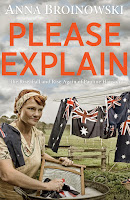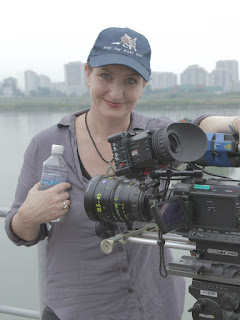In the September edition of the North Melbourne Books newsletter we talk to filmmaker and writer Anna Broinowski about her new book, Please Explain. It's a compelling, up close and personal portrait of Pauline Hanson.
After twenty years of watching Pauline's rise and fall, and rise again, you might think you know it all. Not so. Broinowski had close access to Hanson on her 2015 election bid, what was called the "Fed Up Tour", and she paints an extraordinarily detailed picture of her subject.
Please Explain is a must read for anyone interested in Australian politics.
To view the latest edition of the North Melbourne Books newsletter, click here. To sign up for our monthly newsletter, click here.
North Melbourne Books: Your documentary which aired on SBS, Pauline Hanson: Please Explain, covered Hanson’s 2015 Fed Up Tour. What made you want to write a book about your experiences? Did you have a book in mind at the time of the filming?
Anna Broinowski: When I began filming Hanson in January 2015 during her campaign for Lockyer in the Queensland state election, I never imagined I’d write a book. At the time, Hanson was flying under the political radar - despite her regular paid spots on commercial breakfast TV, most pundits saw her as a serial candidate going nowhere. But Hanson ended up losing Lockyer by less than 120 votes, and with renewed confidence, she mounted a new campaign, for a Queensland Senate seat in the 2016 Federal election. With her bespoke Jabiru 2-seater and pilot-cum- spin doctor, James Ashby, in the cockpit, Hanson flew around regional Queensland on the “Pauline Hanson’s One Nation Fed Up Tour”, promoting herself as the only candidate prepared to stand up for neglected rural voters. People who felt ignored by the major parties, and those who had carried a torch for Hanson since her first foray into politics in the 1990s, flocked to her.
It was while I was filming Hanson at a Reclaim Australia rally in Rockhampton in late 2015 that the idea of a book first sparked to life. Rusted-on supporters, many carrying flags and tee shirts that she’d signed as the leader of One Nation in 1998, mobbed her. But younger voters who only knew her as a celebrity from Dancing with the Stars and Celebrity Apprentice were equally enamoured. I was struck by the absolute banality of the scene. The passionate anti-racism protesters who’d plagued Hanson’s public appearances with violent rallies in the late 1990s were absent. Hanson was spouting the same divisive rhetoric against minorities, refugees and the ‘politically correct’ elites, but this time, a handful of Cops looked on lazily from the shade as Hanson’s ultra-nationalist, flag-waving audience clapped and cheered. It was clear that Hanson hadn’t changed, but Australia had. This was the theme I explored in my 2016 SBS film, Pauline Hanson: Please Explain – but television is a fairly unsubtle medium. I knew a book would enable me to tease out in more depth the indelible impact that Hanson has had on this country.
NMB: Please Explain has an amazing amount of detail, building up an at times lavish portrait – Hanson's frocks, make-up, home furnishings and sprawling estate. Why did you decide to round out what is essentially a political story with such fine attention to detail?
AB: Because the kinds of stories I like to read or watch – especially political ones – are driven by character. Any political analysis – whether it’s about Roosevelt, Kim Jong Il, Gillard, Putin, the Clintons, Catherine the Great or Ghandi – is, in my mind, far more revealing if you learn about the personality behind the power. And in the case of Hanson, you couldn’t ask for a more Machiavellian, devious, passionate and conniving cast of characters. I have always been interested in anti-heroes and unbelievable-but-true stories. Hanson’s rags to riches journey – from fish and chip shop owner, to populist politician, to prison, to celebrity redemption on Dancing with the Stars and mainstream legitimacy in the Federal senate - is one of the most bizarre stories in modern Australian politics. The fact that Hanson’s trajectory from 1996 to 2017 also parallels Australia’s own swing to the right under Howard and his successors sealed the deal for me. Understand Hanson and what’s driving her, and you start to understand the ultra-nationalist ideologies currently sweeping the West under Hanson’s populist contemporaries: Le Penn, Farrage, Wilders and Trump.
NMB: You spend much time during the book trying to get Hanson to see that some of her views, on race especially, are damaging and harsh. Yet she seems to be locked behind a fortress of confirmation bias, refusing to speak to Muslim leaders or even read alternative views. Why do you think she refused to meet anyone?
AB: Because, ultimately, remaining “strong” on Muslims and refugees continues to win Hanson support. She is no longer the “unpolished politician” she claimed to be in her infamous Maiden Speech in the House of Representatives 1996: she is battle-scarred and wily, and knows how to stay on message. Hanson often claims she will “listen to anyone” and simply wants all Aussies to get a “Fair Go,” but this is disingenuous. The “Aussies” of Hanson’s tribe are a narrow section of the population. They do not include Muslim Australians, anti-racists, Refugee advocates, progressives, female domestic abuse survivors, Indigenous rights activists, asylum seekers, human rights campaigners, marriage equality supporters, environmentalists and even – if Hanson’s fat shaming of the global anti-Trump protesters who marched last year is to be taken at face value - overweight women. These groups all fall under that convenient, catch-all label which conservatives have used to stifle their adversaries since the end of the Keating era, the “politically correct”. But the Australia Hanson is fighting for is a mirage. It has not existed since the 1950s, the decade in which her unique brand of patriotism was formed. Each time Hanson claims she is speaking for “all Australians” on TV, she is selling the myth that her views are not marginal, but dominant. If she had to debate with former NSW Chinese-Australian MP Helen Sham Ho, or with Muslim writer Randa Abdel Fatteh, both of whom she refused to meet in my film, the mantle of mainstream relevance in which she’s worked so assiduously to cloak herself would fall apart. At 63, Hanson is not interested in “fair and balanced” debates. Absolutism is her greatest political asset. It’s worked for her so far, it continues to get her media, and she’s not prepared to let it go.
NMB: Please Explain paints perhaps one of the fullest pictures we've yet seen of Pauline Hanson – her strengths, her weaknesses, her vulnerabilities, her doggedness. What do you hope the book will contribute to the public debate?
AB: I have always been torn about writing this book. The idea of giving Hanson more oxygen doesn’t sit easily with me, as I disagree with most of her views. But if I hadn’t written it, someone else would. Love her or hate her, Hanson changed this country, and she and her supporters are still going strong. If you’re on the left side of politics, you can’t in good conscience shun and ignore her (as the majority of progressives attempted to do in the 1990s), without also shunning and ignoring the one million plus Australians who continue to endorse her views. It’s time we understood where Hanson has come from, why she thinks the way she does, and how she manages to continue to resonate with a significant part of the population. If you care, like I do, about resurrecting the inclusive, multicultural values that once drove mainstream debate in this country, and want to protect these values from being further eroded by the amoral, neo-liberal right, then understanding Hanson – and how she helps fuel the conservative agenda – is perhaps a good place to start. I guess I hope, naiively perhaps, given how many books are out there - that Please Explain will spark a deeper, more future-focused debate about Australia and where we’re headed, than the truncated offerings of the 24-hour news cycle. I hope it will prompt people to have robust chats with their friends and relatives about Hanson and her views – without wrecking dinner of course! Many Australians who vote for Hanson and One Nation do so secretly – which is partly why Hanson’s 2016 victory blindsided so many pundits. You’ll be surprised, once you dig, by who of the people you know despise Hanson, and who thinks she has a point.
NMB: What books are you enjoying reading at the moment?
AB: Jane Mayer’s Dark Money: The Hidden History of the Billionaires Behind the Rise of the Radical Right, about the secret takeover of America’s institutions of power by the Koch brothers and their allies. I recently finished Stanley Kubrick and Me: Thirty Years at His Side, a 2016 biography of the filmmaker by his ex-chauffeur, Emilio D'Alessandro. And Human Acts, Han Kang’s harrowing novel about the brutal oppression of protesters in the 1980 Gwangju uprising in South Korea.
But I have to confess - and I hope North Melbourne Books readers won’t ask for a Please Explain - I am also addicted to thrillers, satire and Sci Fi – the more formulaic and plot driven the better. It’s literary fast food, for when I’m too fried at the end of the day to think. I raid Gould’s second hand books in Newtown regularly, and devour anything from old William Gibson, James Elroy and John le Carré paperbacks to Lee Childs, Colin Harrison, Jon Ronson and Patricia Cornwell.
Please Explain: The Rise, Fall and Rise Again of Pauline Hanson, by Anna Broinowski. RRP: $34.99


No comments:
Post a Comment